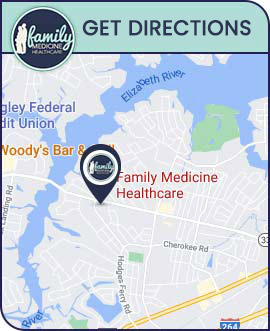Long QT Syndrome Treatment Q&A
Long QT syndrome can affect your heart rhythm, and it’s important to diagnose and manage it early to prevent complications. At Family Medicine Healthcare, Dr. Samir Abdelshaheed, MD, specializes in diagnosing and treating Long QT syndrome. He is dedicated to creating a personalized treatment plan to manage your condition and reduce your risk of serious heart events. Treatment options may include medication, lifestyle changes, and more. For more information, please contact us today or book an appointment. We are conveniently located at 3925 Portsmouth Boulevard, Chesapeake, VA 23321.


Table of Contents:
What is long QT syndrome?
What triggers long QT syndrome?
What are the types of long QT syndrome?
Does long QT get worse with age?
How is long QT syndrome treated?
Long QT syndrome, also known as LQTS, is a cardiac condition that affects the electrical activity of the heart, leading to prolonged intervals between heartbeats. The name comes from an extended interval between the Q wave and the T wave on an electrocardiogram (ECG). An extended QT interval can disrupt the heart’s rhythm, leading to serious symptoms such as sudden fainting, seizures, or sudden cardiac arrest.
People with LQTS may not show any symptoms, but when symptoms do occur, they can be severe and life-threatening. The syndrome can be inherited genetically or acquired due to certain medications, underlying conditions, or electrolyte imbalances.
Some of the main triggers of LQTS include:
Physical exertion: Intense activities, especially those involving sudden bursts of effort, can trigger irregular heart rhythms in those with LQTS.
Emotional stress: Strong emotions, such as fear or excitement, can trigger LQTS symptoms.
Sudden loud noises: Unexpected noises like alarms or sudden shouts can provoke symptoms in patients with LQTS.
Medications: Certain medications, including some antibiotics, antifungals, and antiarrhythmics, can prolong the QT interval, increasing the risk of symptoms.
Electrolyte imbalances: Low levels of calcium, potassium, or magnesium can worsen LQTS.
Long QT syndrome can be categorized as congenital or acquired. Congenital LQTS is caused by genetic mutations affecting the heart’s electrical activity.
The most common subtypes of congenital LQTS include:
LQT1: This subtype is caused by mutations in the KCNQ1 gene. While LQT1 symptoms are often onset by exercise, they can also be triggered by emotional stress.
LQT2: This subtype, linked to mutations in the KCNH2 gene, is commonly triggered by sudden noises or emotional stress.
LQT3: With symptoms often triggered by sleep or undisturbed rest, LQT3 is associated with mutations in the SCN5A gene.
On the other hand, acquired LQTS develops due to external factors rather than inherited genetic mutations. It often results from the use of certain medications, such as some antibiotics, antidepressants, and antiarrhythmics. Additionally, electrolyte imbalances, specifically low potassium, magnesium, or calcium levels, can lead to acquired LQTS.
Whether you have congenital or acquired LQTS, it’s essential to work with a healthcare provider to manage your symptoms and prevent complications.
The severity of LQTS throughout life can vary from person to person. For some patients, the condition remains stable throughout their lives. However, the risk of severe symptoms like fainting, seizures, and sudden cardiac arrest can increase over time, particularly if the condition is not properly managed.
In addition, as QT intervals tend to increase with age, the condition may worsen later in life. If you’ve been diagnosed with LQTS, it’s essential to see your doctor regularly to monitor your condition and prevent your symptoms from interfering with your daily life and wellness.
Doctors offer a variety of treatment approaches for patients with LQTS, including:
Medications: Your doctor may prescribe beta-blockers to control your heart rate and reduce the risk of arrhythmias. These medications work by slowing the heart rate and reducing the heart’s demand for oxygen.
Lifestyle modifications: Patients with LQTS are advised to avoid known triggers such as intense physical activity and stress. As certain medications can prolong the QT interval, your doctor will advise you on what to avoid. In addition, maintaining a balanced diet rich in electrolytes like magnesium, potassium, and calcium is beneficial.
Medical devices: For those at high risk of life-threatening arrhythmias, an implantable cardioverter-defibrillator (ICD) may be recommended. An ICD continuously monitors the heart’s rhythm and can deliver shocks to correct abnormal rhythms. In addition, a pacemaker is recommended in some cases.
In severe cases, a surgical procedure known as left cardiac sympathetic denervation (LCSD) may be explored to reduce the risk of life-threatening cardiac events. Long QT syndrome is a serious disorder that requires diligent management and regular monitoring. For comprehensive support managing LQTS, schedule a visit with the dedicated team at Family Medicine Healthcare in Chesapeake. For more information, please feel free to contact us or book an appointment online. Family Medicine Healthcare clinic is conveniently located at 3925 Portsmouth Blvd Chesapeake, VA 23321. We serve patients from Chesapeake VA, Portsmouth VA, Norfolk VA, Hampton VA, Suffolk VA, Virginia Beach VA and surrounding areas.








